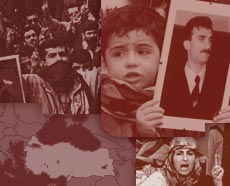

Ocalan, Turkey and the Kurds
Turkey's arrest of Abdullah Ocalan sparked a frenzy of protest actions in 16 European cities. Why would thousands of people put their bodies on the line to aid a man wanted for terrorism? The answer may lie in the plight of the Kurds, a people who were denied a state in the redrawing of the maps at the end of World War I.
Who Is Abdullah Ocalan?
He is the head of the Kurdistan Workers Party (PKK), a leftist guerrilla movement that has waged a bloody battle against Turkey for Kurdish independence. More than 35,000 people have been killed since the PKK launched its guerrilla campaign in 1984. Human rights groups have criticized both sides for their conduct in the conflict. Ocalan is now being held in Turkey on charges of treason and terrorism, after failing in a three-month quest to find asylum in Europe..
Who Are the Kurds?
The Kurds are a non-Arab, mostly Muslim people with their own language and culture. They number some 20 to 25 million, and are concentrated in a heartland that spans southeastern Turkey, northern Iraq, Iran and parts of Syria. The Kurds were promised their own state in the 1920 Treaty of Sevres, which carved up the Ottoman Empire after its defeat in World War I. But Turkey subsequently forced a renegotiation of the treaty, leaving the Kurds as a nation without a state. Large numbers migrated across Europe (there are as many as half a million in Germany alone) and also into the former Soviet Union.
The Kurds in Turkey
The Kurds are not recognized as a minority in Turkey, and do not enjoy the same language rights as other minorities. Turkey's military government in 1991 lifted a ban on the use of the Kurdish language in unofficial settings, but it remains illegal in schools, broadcasts and politics. Turkey counters criticisms on this score by insisting that Kurds are fully integrated into society on an equal basis with Turks, citing as evidence the Kurdish origins of such mainstream politicians as the late prime minister Turgut Ozal.
The Kurdish Struggle
Despite decrying their treatment at the hands of the Turks and Iraqis, the Kurds are far from unified. Saddam Hussein has previously exploited violent divisions among rival Kurdish factions in northern Iraq to maintain control, while Turkey's Kurdish political groupings are perennially in conflict. Those conflicts are reinforced by a history of betrayal and exploitation of Kurdish movements by the region's power players -- most recently, Syria ended its longtime support for Ocalan as a diplomatic gesture to improve relations with Turkey.
Ocalan's Flight
Having outlived his usefulness to Syria -- which had allowed him to use bases in its zone of influence in Lebanon -- Ocalan was forced to flee to Russia last October. In November he arrived in Italy seeking asylum, but having failed to find sanctuary there he left Rome sometime in January for an undisclosed destination. His whereabouts became something of a mystery after he was turned away from the Netherlands and reportedly failed to enter Switzerland and Greece. Before his arrest in Kenya he was rumored to have been in Belarus under Russian protection.
Next Page- The Kurdish Question After Ocalan